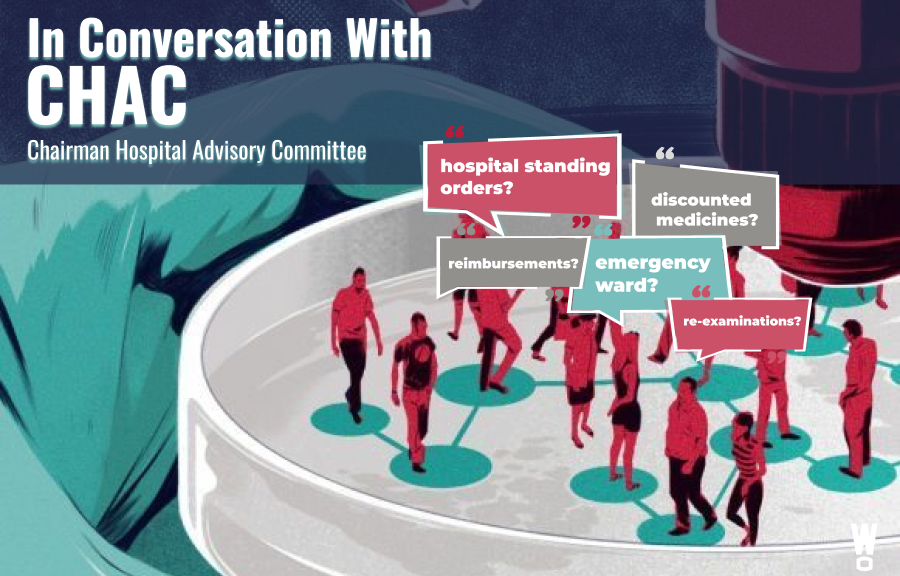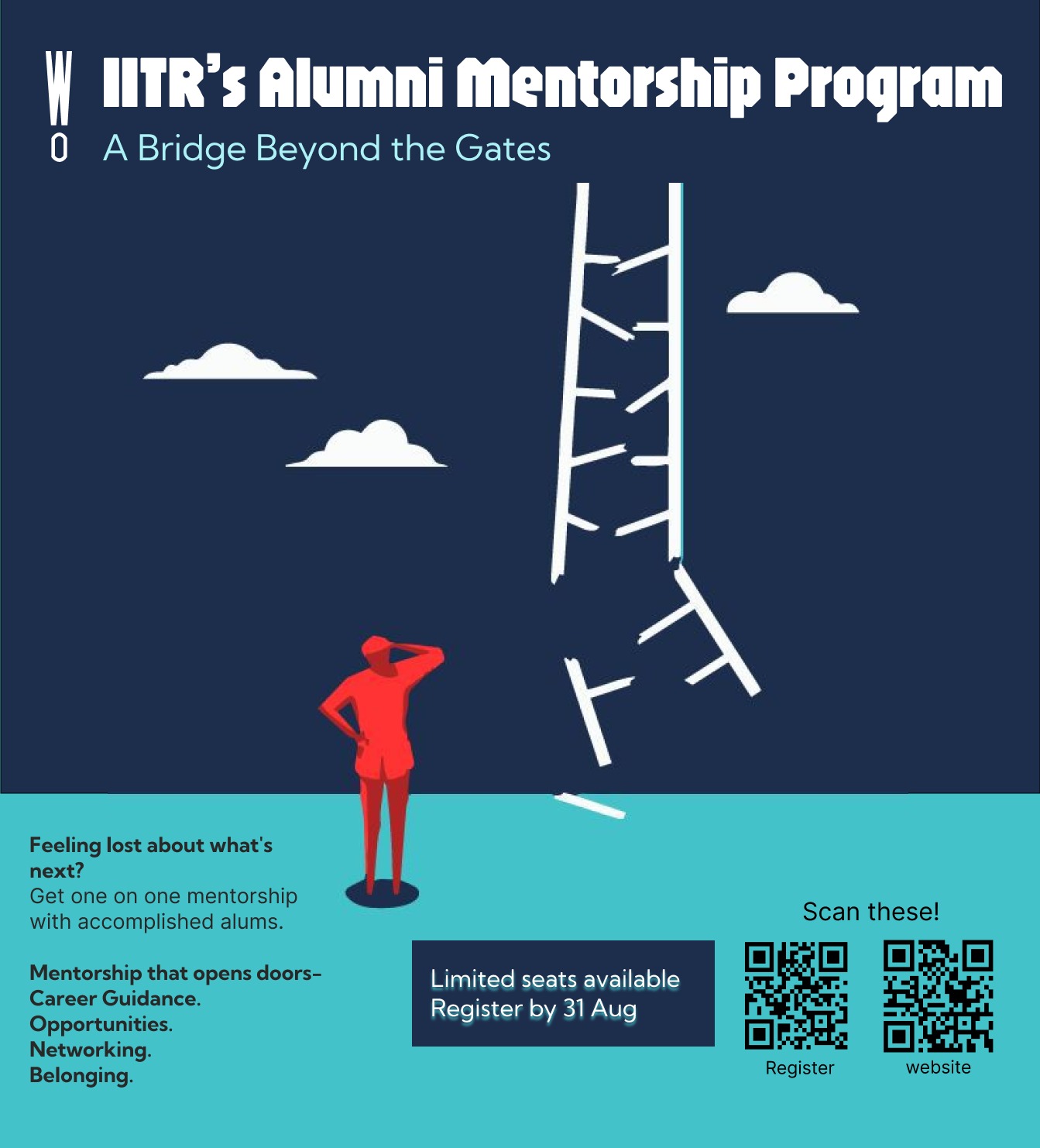

Body of IITR

Life at IIT has a way of humbling you. It doesn’t matter whether you’re a wide-eyed fresher still adjusting to mess food and lecture halls, a second-year torn between fields of interest, a third-year chasing that dream internship, or a final-year student staring down the uncertainty of placements and higher studies—every stage comes with its weight. The campus buzzes with opportunity, but beneath it lies an undercurrent of pressure: Am I making the right choices? Am I falling behind?
In this whirlwind, the noise can get overwhelming, and it’s easy to feel cast aside. What you long for in those moments is conversation and a helping hand from someone who’s walked the same maze and found their way through. Someone who can share not just advice, but perspective from beyond the campus walls, from the world you’re preparing to step into.
It was 2020, when an alumnus visiting campus for a reunion felt the pull of giving back and sensed the growing need for guidance among students. Mr. Kiran Panesar, ‘89 batch alumnus of IITR, currently running Ambient Security, and his team took that spark forward, starting the Alumni Mentorship Program (AMP) with 6 mentors and 100 students joining in the very first cohort. Over time, this initiative has grown into a network of 200+ mentors (from the batch of 1966 all the way to 2023) and more than 300 student participants.
The program is entirely free for students, run by alumni volunteers who simply want to give back. Its design is simple but powerful:
The format is flexible: some mentorships last years, others just a few meetings—but all evolve into lasting relationships that stretch well beyond campus, grounded in shared stories and continued guidance.

AMP has supported students across the spectrum : B.Techs of all years, M.Techs, and PhD scholars. With mentors by their side, students have secured internships, launched startups, pursued research and gone for higher studies abroad.
The impact, however, extends beyond professional milestones. Mentees often form lasting bonds and stay connected with their mentors outside the program, continuing to seek guidance at key junctures in their journeys. And perhaps the most meaningful outcome: mentees returning as mentors, strengthening the program for the next generation.
With over 200 mentors from batches spanning 1961 to the present, the program brings together a remarkable diversity of experience. The mentors include leaders who head global corporations, founders of multiple successful startups, distinguished academicians, and senior civil servants responsible for major national projects.
Beyond one-on-one guidance, the program creates vital networking opportunities—giving students access to perspectives, connections, and possibilities they might never encounter on their own.
AMP thrives on the conversations between alumni and students. To glimpse this more closely, I spoke with one of the mentors in the program - Mr. Animesh Bisaris, a 1984 alum, who shared his journey into mentorship, his reflections on today’s students, and his vision for the program’s future:
Animesh Bisaria, a Gold Medalist from IIT Roorkee with over 40 years in the IT industry, is the CEO of FASTGlobal and MD of KNIO Infotech. Based in Bangalore, he has been mentoring students for several years through the IIT Roorkee Alumni Mentorship Program, guiding over a dozen so far.
How would you describe your approach or style of mentoring students?
For me, the journey always begins with “KYM — Know Your Mentor/Mentee”. I make it a point to connect with students personally, even before the formal mentorship starts. Many take time to open up — often struggling with confidence, communication, or simply adjusting to IIT life. Every student carries their own story, shaped by family, background, or circumstances. My first focus is to build trust and understand their world. Once they feel comfortable, they start sharing more freely — and that’s when the real mentoring begins. Then, we shape our sessions around the student’s needs — whether it’s career guidance, exploring fields of interest, or creating networking opportunities. Every student is different, so the mentoring journey is always tailored.
Is there a mentorship experience that stands out to you, where you felt the program truly made a difference?
Yes, one that stays with me is a student who was completely blind — an exceptionally bright child. I was able to support him in navigating campus life and also helped him land an internship at ISRO. This is where the strength of the program really shows: mentors come from diverse, accomplished fields and can connect students to the right opportunities and people. But it’s not just about career breaks. Through mentorship, students also learn how to communicate better, present themselves with confidence, and build skills that will support them far beyond IIT.
Over the years, have you noticed any changes in the kinds of questions or concerns students bring up?
In my 14 years of mentoring, I’ve noticed that career-related anxiety is by far the biggest concern. Many students feel disappointed about not getting into the CSE branch and worry that their options are now limited. They’re often unsure about what direction to take — what to study, how to secure a good internship, or what career path to pursue. Alongside this, there are other challenges too: adjusting to a new environment, building friendships, communicating confidently — I’ve met students who couldn’t even manage a simple greeting in our first interaction. Missing home and dealing with mental health struggles also weigh heavily on them. All of these concerns come together, but career uncertainty seems to be at the center for most.
Student mental health is a growing concern at IITs. As a mentor, how do you see your role in supporting students emotionally, not just academically or professionally?
Yes, that is a major concern. I once had a mentee who had been struggling with depression for nearly eight months — triggered by not getting into a preferred branch, fear of an uncertain future, and the pressure of not wanting to let parents down. Being in such a demanding environment only made it worse. What he really needed was someone to talk to, someone who could guide him and help rebuild his confidence and optimism.
These challenges are not isolated — they are widespread and need to be addressed proactively. I believe the institute should hold at least one dedicated wellness session every month for freshers, so they don’t feel alienated in their early days. Within the mentorship program too, our role goes far beyond career advice or networking. We try to provide a genuine support system — a safe space where students feel heard, understood, and encouraged to navigate both academic pressures and emotional struggles.
Looking ahead, how do you see the Alumni Mentorship Program evolving?
I hope to see many more mentees and mentors joining in the coming years. One challenge right now is that even after registering, some students hesitate to open up or maintain regular contact. My vision is for the program to become more two-sided — where students feel comfortable reaching out freely, and mentors can also connect with them beyond just formal emails or LinkedIn messages. Strengthening this flow of communication from both ends will make the mentorship bond much stronger.
The last date to register is August 31, 2025, and seats are limited.
For more information and to register for the mentorship program, visit: https://www.iitramp.org/iitramp